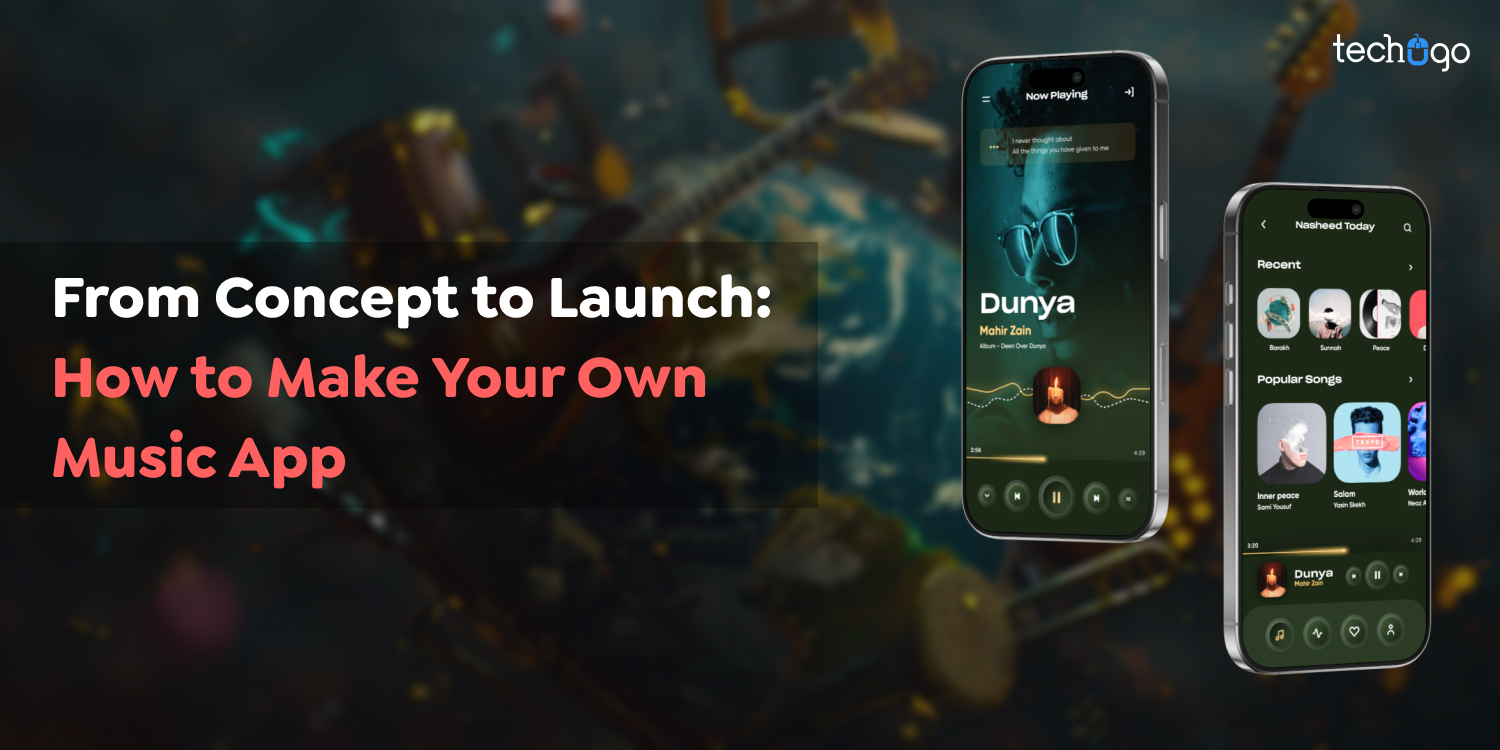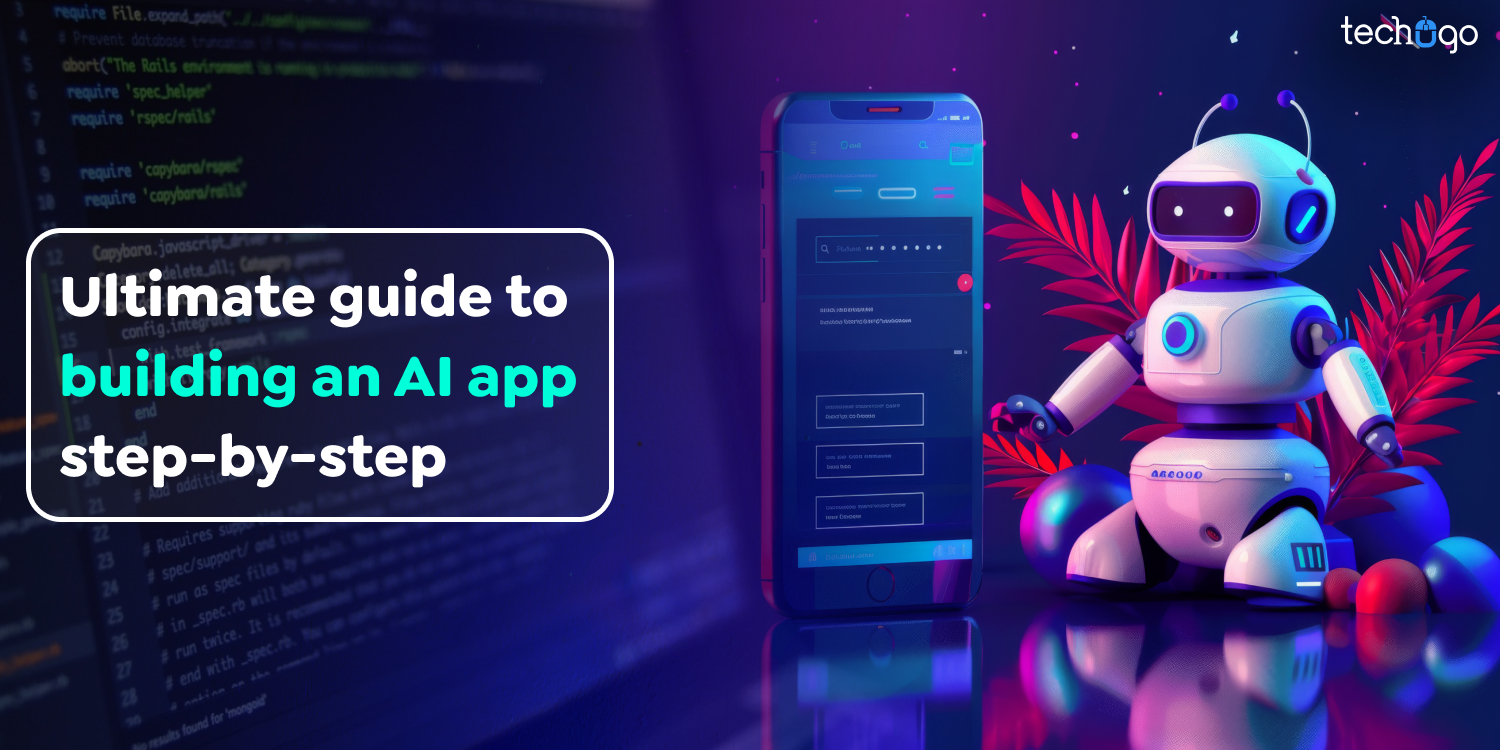3 Mar 2025
From Concept to Launch: How to Make Your Own Music App
Matthew Connor

Personalization and connectivity are important factors in the digital age. Bands, musicians, and singers have a unique opportunity to benefit from music app development, which strengthens their relationships with followers. Imagine an app that does more than just play music; it becomes a lively community hub where users can meet, share exclusive content, purchase products and concert tickets, and have enhanced experiences at events.
This can be accessed anytime, anywhere. It’s not just a vision or idea, it’s at the fingertips of any musician. Since mobile phones and high-speed internet became more popular, the music streaming industry has become one of the fastest-growing sectors in the music business.
Revenue from the music industry in Canada is expected to grow at an average annual rate (CAGR 2022-29) of 7.35%, reaching CAD 609.56m by 2029. Despite the intense competition in Music App Development, there is still plenty of room for a new and exciting streaming music app.
Creating a profitable music app is not an easy task. With so much competition in the market, it requires substantial effort and strategic thinking to music app development that stands out, is financially viable, and profitable.
In this post, we’ll explore how to develop a highly successful music streaming app by discussing key aspects such as features, user interface, and more.
What is a Music Streaming App?
Music streaming applications are types of apps that allow users to browse, stream, and save music across various genres, artists, and styles. These apps don’t need much of an introduction, as we’ve all been using music streaming platforms for quite some time. Spotify, Shazam, and Pandora are just a few of the most popular music streaming apps.
Music app development is changing the way we listen to music. They enable users to share and discover the latest music selections. One of the main reasons for the growth of music streaming apps like Spotify is that they give users access to an extensive music library without the need to purchase entire albums.
In music app development, the first step is to understand how they work. Music streaming apps use complex technology to stream music to your device while you listen.
Here’s a brief overview of the most important steps:
- You can browse through the app’s collection, search for specific songs, or receive personalized recommendations.
- Your request is sent to the app’s servers, which identify the selected track and its location within the music storage system.
- The app pre-buffers a short segment of the song (usually just a few seconds) before playing it. This ensures continuous playback without interruptions.
- As you listen, the app continues to download and store the next parts of the song, ensuring smooth audio playback.
- The music file isn’t fully downloaded. Instead, it’s broken into small packets and streamed sequentially.
- This is done using protocols like HTTP Live Streaming (HLS) or MPEG-DASH, which ensure smooth playback even if internet speed fluctuates.
Types Of Music App Development
Selecting the type of music app you want to develop is the first step in refining your application concept. Music streaming app development comes in various formats and offers different options for listening. However, the most well-known music streaming apps generally fall into following categories:
On-Demand Music Streaming Apps
Think Spotify or Apple Music. The major players allow you to stream your favorite tracks anytime you want. You can access vast collections of music to find albums, songs, or even artists, with integration with smart devices like Alexa and Google Home.
These are the top choice for people who want more control over their music. If you’re developing an app in this category, be sure to focus on features like high-quality audio streaming, a user-friendly interface, and effective discovery tools.
Cloud Storage
This type of app offers cloud storage, allowing users to organize, store, and manage their songs. It enables users to stream music anywhere, anytime. AudioBox is an example of a cloud-based music player.
Music Discovery Apps
If the idea of discovering new music or emerging artists excites you, apps like SoundCloud and Bandcamp are where the magic happens. They connect independent artists with listeners and create a sense of community. These music discovery apps are perfect for those looking to explore beyond mainstream music. Developers focusing on this type of music app development should prioritize social features and an easy-to-use uploading system for creators.
Radio Stations
Music radio apps allow users to access a variety of radio stations, organized by themes such as music genres, artist-focused playlists, moods, decades, and more. These apps can filter search results based on user preferences, recommend stations that users may enjoy, and are a great way to discover new songs.
Live Music Streaming Apps
The concert experience has gone digital, and mobile apps now allow fans to enjoy live shows from the comfort of their homes. These apps became extremely popular after the pandemic and continue to be a popular alternative to in-person performances.
They are also beneficial for artists, providing a new revenue stream while giving users access to their favorite performers. To succeed in this field, it’s essential to focus on high-quality audio and video streams, as well as interactive user features.
Niche-Specific Music Apps
These apps cater to a specific audience or niche. For example, Calm focuses on soothing meditation music, while Rock My Run is designed for fitness enthusiasts and features curated workout playlists. If you’re considering creating a niche music app, identifying a passionate and underserved market is key. Once you’ve identified your target market, focus on features that enhance the user experience.
Benefits of Music App Development
Investing in music app development can provide startups with the following benefits:
Cater to Evolving User Preferences
When circumstances change, everything is affected, especially people’s needs and wants. Similarly, young people are increasingly using streaming services. Their demand for customized experiences and a variety of content opens the door to innovative applications. This is one of the main reasons we should develop a music streaming app to cater to the needs of today’s audience.
Capitalize on a Thriving Market
Looking to earn millions (or perhaps even more)? According to data, the streaming music industry is expanding rapidly and is expected to grow to CAD 147.90 billion by 2030. This presents an excellent opportunity for new players to capture a piece of this increasing market. Existing players are already maximizing the market’s potential, one way to do this is with a music-related app.
Curate Exceptional Content
A top-tier music streaming app allows you to offer carefully curated playlists based on moods, events, or themes, providing users with a unique and personalized listening experience. It’s no surprise that this approach helps build an audience and establish a strong reputation for your company in the marketplace.
Fill Niche Gaps
You can create a music streaming app that reaches untapped markets. There are plenty of areas that remain unexplored. From time to time, we discover new ways to capitalize on these markets for seamless revenue. Identify underserved markets, such as classical music lovers or fans of specific genres. Then, tailor your app to meet the unique needs and preferences of each audience.
Embrace Innovation
Everyone strives to be innovative, and each person has their own contribution to the process. Your concept for a music app could become the next big thing to disrupt markets and transform the way people experience music forever. Make your mark by incorporating the latest technology, such as AI-powered recommendations, immersive AR/VR experiences, or even social listening features.
Must-Have Features of Music App Development
Are you looking to invest in music streaming app development services? It’s essential to ensure that your app includes all the key features needed for a successful music application. Whether you’re developing an app for casual users, audiophiles, or fitness enthusiasts, there are certain essential elements that every music streaming service should have to provide a great user experience.
Signing Up and Registration
This is one of the most important features to include in your music app development. It allows users to join your service. It’s beneficial to offer multiple sign-in options, such as phone numbers, emails, or social media accounts, so users can choose the method that works best for them.
Catalog
A catalog feature displays a list of everything the app offers. By using technologies like AI or machine learning, you can also create a catalog that provides personalized recommendations to your app’s users.
Music Library
One of the most important features in music app development is the variety of tracks available. Users expect a broad selection of music across different genres, from new chart-toppers to obscure indie artists. License agreements with music labels and publishers are essential to stream content legally.
Search
This feature is particularly very useful when users are searching for a specific music track. You can allow users to input track details or even include a voice assistant to enable them to search for songs using their voice.
Play Offline
You can also allow users to download their favorite songs, so they can listen to music even when there is no internet access.
Personalized Playlists & Recommendations
Looking to build a music streaming app? One of the main advantages of music streaming apps is the ability to provide personalized content. Both algorithms and ML play a key role in recommending new tracks to users based on their music consumption habits.
Push Notifications
Push notifications help keep users informed about the latest updates related to the app. This can help increase user engagement.
Well-Designed Music Player
It’s hard to imagine a music app without a music player. You need to design an audio player that allows users to enjoy music in the background without interrupting their normal tasks on their phones.
Social Media
Many people love sharing the music they listen to on social media. Therefore, it’s a good idea to add social media sharing buttons, allowing listeners to share their favorite music with friends and family.
In-App Payments
The primary goal behind music app development is to generate revenue. This is why it’s essential to integrate an online payment system into your mobile app, allowing users to pay for subscription charges effortlessly.
How To Build Your Own Music App?
Are you looking to begin music app development? To do this, create a step-by-step strategy to follow and implement the plan. Here is the procedure we suggest:
Do In-Depth Research
The first step in music app development is to brainstorm ideas and define your concept clearly. Conduct thorough market research. Analyze the competition and take a closer look at their designs to develop a concept that will make your app stand out and be unique.
Think About The Audience You Want To Reach
One of the key elements of creating a streaming app is understanding the people who will be using your app. This will affect your app’s payment system and features, as they should be tailored to the audience’s age and musical preferences.
Select The Right Technology Stack
Once you’ve completed research on your ideas and target market, it’s time to choose the features you want to include in your app and the technology stack needed for development. There are various functions you can incorporate, depending on how you plan to attract customers. For example, if you want to provide recommendations or suggestions for songs, integrating AI into your app’s features could be beneficial.
Form a Team
Once you’ve figured out the tech system, it’s time to assemble a team. Be sure to put together a group of competent individuals who can meet your application’s requirements and perform the job efficiently.
Licensing
Licensing is an integral part of music app development. The licensing process is crucial to ensure that your users can stream legal audio content. Songs have two types of copyrights. The first is associated with the audio recording, which is controlled by the record label.
To obtain the right to license sound recordings, you must contact record label representatives for a binding agreement. The second copyright is tied to the song itself, including the lyrics and composition. This type of copyright can be owned by the publishing company or the songwriters.
Build An MVP
Before launching your product, you need to design a Minimum Viable Product (MVP). One of the benefits of preparing an MVP is that it allows your team and you to gauge customer interest in the product without fully developing it. It also helps assess its value in the marketplace.
Create and Test Your Music App
At this stage, the music streaming app development company begins coding to bring your music app idea to life. Ensure that the app developers you choose follow secure best practices when developing the app’s code. Stay informed about the progress of music app development to ensure that all your goals are being met effectively.
Once the development process is complete, test your mobile app thoroughly to ensure that no issues are introduced. After testing is finished, the next step is to make your app available on the Google Play Store or App Store.
Keep Up-To-Date With Upgrades and Support
Once the app is launched, the work doesn’t stop there. Issues and bugs may arise, so it’s essential to continuously monitor the app’s performance and provide customer support. Additionally, the app should be updated regularly, as the music industry is always evolving.
Cost To Create a Music Streaming App
Unsure about the cost? The average costs for developing music apps range from CAD 12,000 to CAD 95,000, depending on features, complexity, and various other factors. However, it’s not easy to estimate app development costs without knowing the specific requirements for the project. For an accurate cost estimate, it’s highly recommended that you contact a mobile application design company.
The cost of music app development is determined by the following factors:
- Mobile app development platform
- The features you’ve selected for your application
- The app development company you choose
- Licensing fees for your app
Since these factors vary from one app to another, it can be difficult to determine the exact cost for music streaming app development. Based on the scope of the project, the company will provide cost estimates for developing a music app.
How Music Streaming Apps Earn Money?
Now that you’ve gained some insights into music streaming apps, now let’s understand how they earn profits.
Freemium Model
This monetization strategy is particularly attractive for startups in the early stages that need to expand their reach. The model starts with a free trial period, followed by additional paid options. It’s also a great way to evaluate the features you want to include and whether they’re necessary.
For example, you could enable a feature that plays a specific morning radio station when you wake up by linking it to your phone’s alarm clock. The costs may be small, but the number of users who subscribe will help identify what appeals to people.
In-App Advertising
Direct advertising can be placed within your music streaming app using two different options. The first option is to integrate short audio advertisements into music-related content. The second is to use media ads. However, it’s important not to overdo it—too many ads can deter users and reduce the appeal of the app.
Subscriptions
Once you have built an impressive and loyal user base who are satisfied with the app’s features, you can start encouraging users to move from an ad-supported plan to a premium, ad-free plan. It’s recommended to create various pricing tiers, including exclusive options or ad-free plans. Additionally, you can offer plans for students or families to help expand the user base by offering discounts.
Challenges Faced During Music App Development
The process of music app development can be thrilling. However, be prepared to confront some major obstacles along the way. Let’s take a look at the challenges you may encounter during music app development.
Music Streaming App Development Can Be Expensive
Music app development is an expensive and labor-intensive task. There are many factors to consider, including software development, licensing, marketing, product features, design, and the hourly rates charged by the development team. For new companies, these costs can be substantial, and sufficient funding is necessary to finance the project.
Establishing Your Space in a Crowded Market
With major players like Apple Music, Spotify, and Amazon Music dominating the marketplace, it can be challenging for new companies to create a distinct identity and establish a presence. Brands must focus on original ideas, seamless functionality, and flawless products to compete with others and stay one step ahead.
Revenue Sharing
Music apps must share their earned revenue with artists and copyright owners. For example, Spotify keeps 30% of its earnings, while the rest is distributed to musicians, songwriters, and other copyright holders.
Licensing and Copyright
Licensing and copyright should not be seen as a huge obstacle when developing an app, but they are important aspects that should not be overlooked. Music streaming apps must ensure they are functional when Public Performance Rights are obtained.
Conclusion
The market for music streaming continues to grow daily. Technology has enabled people to stream music everywhere and anywhere with a click of their fingers. These apps offer high-quality audio quality, a huge selection of songs available to choose from, free streaming, and a range of paid subscriptions.
Making a music streaming app can be a lengthy procedure that needs plenty of money along with a variety of technical aspects to figure out, including creating a distinctive concept, obtaining the best developers, creating the correct design, and many other elements.
It’s no secret that the music streaming business is incredibly competitive. However, that doesn’t mean it is impossible to stand out in the crowd. It is possible to stand out, and for this, you must discover your own unique value proposition.
Get In touch
We are excited to here from you and let’s start something special Together. Call Us for any inquiry.
Write us
sales@techugo.caJust a call away
About you




